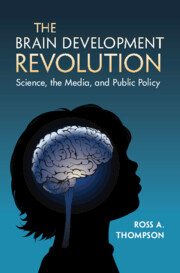
- Publisher:
- Cambridge University Press
- Online publication date:
- August 2023
- Print publication year:
- 2023
- Online ISBN:
- 9781009304276

The science of human development informs our thinking about children and their development. The Brain Development Revolution asks how and why has brain development become the major lens for understanding child development, and its consequences. It describes the 1997 I Am Your Child campaign that engaged public attention through a sophisticated media communications effort, a White House conference, and other events. It explores the campaign's impact, including voter initiatives to fund early childhood programs and a national campaign for prekindergarten education, but also several missed opportunities. The study examines why brain development compels our attention, why we are – but shouldn't be – neurodeterminists, and the challenges of communicating developmental brain science. This book examines the framing of the brain development story, the selectivity of the messaging, and overpromising the results of early programs. Lastly, it discusses proposals for how science communication can be improved to better serve children and the public.
‘If you’ve ever experienced awe at a picture of a brain lit up, or felt wonder at the smile on a baby’s face, you will benefit from reading this book. Ross Thompson provides the first authoritative story of the science, people, and events of the recent brain development revolution. Thompson gives us novel perspectives on the power of developmental neuroscience. He opens new vistas on the opportunities of parents, teachers, citizens, and scientists for helping every child flourish. This is a marvellous book.’
Andrew N. Meltzoff - Co-Director, Institute for Learning and Brain Sciences, University of Washington, USA, and co-author, The Scientist in the Crib: Minds, Brains, and How Children Learn
‘The Brain Development Revolution provides a fascinating, insightful account of how brain science came to dominate early childhood policy debates - driven not by ‘the science,’ but by public messaging about that science, with successes, missed opportunities, and unintended negative consequences for early childhood policy. This important book illuminates the often obscured interplay between scientific knowledge, political priorities, and values in early childhood advocacy, and highlights the need for broader, more inclusive policy deliberations to advance better policy for young children.’
Katharine B. Stevens - Founder and CEO, Center on Child and Family Policy, USA
 Loading metrics...
Loading metrics...
* Views captured on Cambridge Core between #date#. This data will be updated every 24 hours.
Usage data cannot currently be displayed.